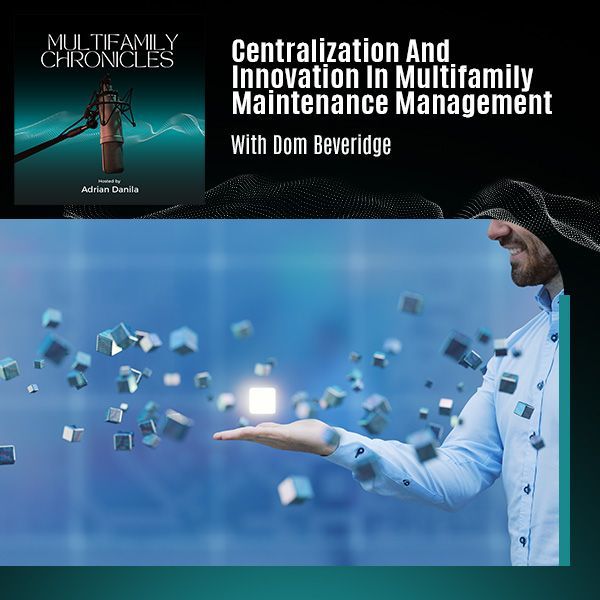Improving Company Culture: How To Make On-Call a Positive Experience With Paul Rhodes
Culture is the foundation of maintenance performance, and a culture of trust is essential to handling on-call situations effectively. In this episode, Paul Rhodes, a Senior Manager for Maintenance Learning at Brookfield Multifamily, talks about on-call situations and the impact of culture on maintenance performance. Paul shares his insights on how a good or bad culture can influence how on-call maintenance is handled and how company culture often plays a role in performance. He emphasizes the importance of creating a culture of trust and shares his experiences working in maintenance and the lessons he's learned along the way. He also delves into ways to improve company culture and turn on-call from a dreaded issue to a valuable opportunity for growth. Join us as we explore the power of culture and the importance of trust in maintenance.
---
Watch the episode here
Listen to the podcast here
Improving Company Culture: How To Make On-Call a Positive Experience With Paul Rhodes
Right here with me in this episode, I have Paul Rhodes. Welcome to the show, Paul.
Adrian, it's awesome to see you again.
Paul, for those that don't know you yet, you are a Senior Manager for Maintenance Learning with Brookfield Multifamily. I would like to pick up where we left off in the previous episode. That is the big topic of culture and how good or bad culture affects certain things within an organization. The one that I want to start with this episode is on-call. How does a good or a bad culture affect the way the on-call is being seen or handled? How does that influence it?
It has a huge influence on it, especially given the definition that I'm operating from. The feelings around the way a decision is made or not made come in big time during on-call because on-call, by its nature means that the office is closed. There's nobody else available right then and there. Oftentimes, it's after hours. It means we're dealing with evening all the way around the clock until the next morning. That's an overly broad term but if there is not a good culture and that maintenance technician is there at 2:00 in the morning with water flowing, the immediate thing is you stop the water. If the pipe broke or the sprinkler was hit, the obvious answer is you stop the water.
Where culture comes into play, first of all, is making sure that the maintenance technician understands those standards. That SOP is the fact that we never leave water dripping or unattended because of the continuing effects that the water ends up having. Once the water is taken care of or the urgency or the emergency is done, what happens next? What is the next step? What power does the maintenance technician have to do what is next?

For instance, if a management company has a zero overtime policy, no overtime but you have to respond after hours for emergencies and crises, I can understand. We've only got a limited amount of money in our budget. We don't budget for overtime because we don't want it to happen. It does happen. The pipe breaks. My maintenance technician has an overriding feeling that he's going to get yelled at if he works a long amount of time.
The pipe broke. The culture of heavy enforcement of overtime means I stop the water, call water extraction and go home. That is a direct result of a culture that emphasizes the budget over our resident relationship. That has happened to management companies I've worked at in the past where they don't do that. The technician doesn't stay to meet the carpet company and make sure that the water extraction happens properly.
We do what we can to save the residents' belongings or needs. Another outgrowth of that is there's a big trend I've heard from a lot of maintenance technicians and properties that maintenance comes out after hours or on the weekend. They do three hours of an emergency call. That means that because we have a zero overtime policy, you must go home three hours early. What does that reinforce? 1) It reinforces that my maintenance technician needs to get out of there as quickly as possible and 2) Under normal circumstances, we've got 40 hours' worth of work that I took up 3 hours off of my normal schedule.
That also means that I need to cram 40 hours' worth of work into 37 hours in a week because I am forced to go home. Not only that but I'm held responsible for those three hours of things that I did not accomplish because I came out late at night. Secondarily, what does that say about our maintenance technician's home life? Yes, being an apartment maintenance technician, it's part of the job description. We will have on-call unless the management company has come up with a way to solve it.
That's probably a different discussion of suggestions of things or ways of approaching it but if I am told that by coming out in the middle of the night, I have to go home early. I schedule my week based on being at work on time and being able to leave on time. I have activities with my family, friends and social organizations. Whatever I'm doing in my time, that's exactly what it is. It's my time. I plan and predict my week. From 8:00 to 5:00 Monday through Friday, I am working with the understanding that I will have to respond as a part of this job after hours.
I balance that by a recognition that I will get paid more for that after-hours time than the 8:00 to 5:00 Monday through Friday because that's predictable. First of all, if you tell me by me coming out from 2:00 to 5:00 AM on a Tuesday night means that on Wednesday I have to leave at 2:00 in the afternoon, that devalues that three hours of my sleep time. Second of all, I am punished because, in the 37 hours, I have to work even harder.
Third, I got to be honest. In the back of my head, I'm thinking, “Wait for a second. If I prove to you that I can do 40 hours of work in 37 hours, it means next week you're going to expect me to work with that same intensity or more until the next time I'm on-call and I have to be out five hours due to whatever happens.” All of those are examples of how that culture comes in and fixes. This is what we were talking about the last time we were together. Intention and talking about it, in theory, is good but it's only good in theory. It doesn't do anything until it does something. In other words, until changes are made or the activity is done.
Intention and talking about something is only good in theory. It doesn't do anything until it does something.
If we're saying that culture has an effect on-call hours and how we, as maintenance associates, approach it, let's do that. Let's maybe change some things up. Here are a couple of ideas. What if we hired a position or adjusted a job description to where we do make-ready in off hours? With make-ready, we can plan and predict when they're going to happen. A make-ready occurs in a vacant apartment.
Residents are not there. We can go in at 9:00 at night. The first response to this as a discussion point is, “What about the noise?” How much noise are we making during a make-ready? A lot of it could be construed as normal noises that happen with occupancies like replacing a faucet, switch or fixture. If we go in there and we’re banging, replacing door frames, closets and doing major construction, that's going to have to be figured out but the bulk of what we end up doing in a make-ready apartment unless it's a full renovation could be construed as normal sounds by the neighbors.
Not only that but it's a one-time event because we're only doing it in that apartment. The next night, this person is in a different apartment. The benefit of this for on-call is that means you have a worker who is onsite right then and there already on the clock that can respond to emergencies. That means we have no after-hours on-call. It's a scheduled event and we adjust that workflow. That's one idea.
Before I ask you for more ideas, I want to point this out. This could work and it could work amazingly but you have to have a culture of trust. It goes back to that. The companies I work for have tried it over time. To implement something like this and have someone start at 10:00 and work until 7:00 or 8:00 at night, the main pushback was, “I can't trust those guys to do any work if we're not here,” coming from management and supervisors. That's the real problem.
I agree with you. That is the second pushback. The first pushback is the noise for the neighbors. The second is, “How can I trust them?” In my mind, that's a different conversation. That's a performance. You've got small properties. I worked at a property and honestly, my favorite property was here in Atlanta near 285 and 41. It was 124 units. I was there for a year and a half. I was the only maintenance technician. That's it. There were two people in the office and I was it. That's all. I did everything and yet, it was just me.
Who was watching me when I was doing my job? The manager and I understood the fact that he didn't have enough time to pay attention and go over every work order or look at it. Was stuff getting done? Yes. Did we have callbacks? No. Were residents calling in when issues were happening? No. Why? It’s because the residents could trust me that I would fix what needed to be fixed. They trusted when they called the office that maintenance was going to be deployed.
The property was always picked up. The pool was always operating correctly. When the dumpster got clogged, it was unclogged. All of those things happen. If that can occur in a community with 1 person, why can't it occur with 1 employee on a large team or rotating? To me, that is a performance issue. You've even said it in other episodes where we are putting maintenance technicians in charge of millions of dollars of property and thousands of dollars of parts and components. Apart from that, millions of dollars of liability for our residents and we are putting our maintenance teams in charge of that.
They make decisions for that and you're telling me Mr. Manager or Mrs. Manager regional that you can't trust this person? First of all, are they the right person? Second of all, have we impressed upon them the importance of their role? Third of all, are we treating them as it is? Do they have a feeling that the decisions they make are that important? Do they know how it was?
When I was teaching CAMT and I started the session, in the very first class of each session, the beginning of that day started with a business lesson. The CAMT curriculum starts with make-ready apartments in the book but I always began with the business side of things and a simple question. “What is the best occupancy for a property?” The most common answer I get back is 100%. That's not accurate.
The best occupancy for a community is below 100% because if you're at 100% occupancy, we cannot raise income. We can't meet our requirements like the mortgage, insurance, payroll, parts, contractors, vendors and all of those things. If we're at 100%, then that means we've hit the ceiling on how much money we can collect. At the end of the day, it's a business. We've got to make money. We have to make money.
If your community is sitting at 100%, that is a bad thing. In corporate like yourself and our regionals, everybody knows that. Have we told our maintenance team? The fact that if we're at 100%, it's a bad thing. Not only that but how many times have you heard the complaint from a maintenance team that says, “I've got 3 apartments ready and yet they didn't lease those 3 apartments. They leased the apartment that just moved out. Why can't they lease the ready apartments?”
The answer is because that's not what the resident wanted. That means if our maintenance teams don't have that understanding, that's our responsibility to be sure we provide that. The process of providing that information helps to inform our technicians about the decisions that they make. It also gives us the ability to affect those performance issues because if they make a decision, it's the wrong one.
First, let's not always go to, “If our technicians or employees make a decision, it's the wrong one.” The first mistake is we instantly go to, “What if it's wrong?” Back it up. “What if it's right?” Do we acknowledge to our technicians like, “It was 2:00 in the morning and the pipe broke. You called the carpet cleaning guy out and you stayed behind. You helped. The carpet cleaning people only sent one guy late at night on the truck. You helped remove the pad from underneath the carpet and put the furniture up on the tabs,” that little plastic things up to protect their furniture?
“You helped pull the baseboards off to open up the bottom so we could put the dehumidifier in there to decrease some moisture content faster.” That's the right decision. First of all, do we acknowledge that the maintenance technician made the right decision or is the first thing that they hear, “We spent a lot of money in overtime this month?” That's an example of the culture affecting performance over time.
What if they make the wrong decision? In this made-up example, they call the carpet vendor and then leave and go home. That's the wrong decision. We want to drive and influence correct decisions. How are we going to handle that situation? In that case, in my mind, that's a performance issue but it's a performance issue based on the culture that's behind it, the feeling of how decisions are going to be made.
Performance issues are usually based on the culture that's behind it.
How are we following up with that? If I'm the manager, am I closing my door and muttering behind the door, “I can't believe they don't understand how much money I have to spend and we can't do that? I got to send them home. As a matter of fact, I can't find anybody for the extra help that we need and we need overtime. There is no overtime and money in the budget. Everything's falling into crap and I can't believe that they ticked off that resident. I'm going to get yelled at by the resident because their stuff is not good and they don't have renter's insurance.”
It's all of the cascading issues that began with a wrong decision. Do we respect our employees enough to acknowledge they made a decision? Yes, it's the wrong one in this situation and circumstance. As the manager, do I respect my employee enough to say, “Let's have that conversation. I need to trust you to tell me why you did it without me blowing up at why you did it. You made a mistake?”
At the end of the day, the apartment's going to be fixed and hopefully, we'll repair that relationship with a resident but it's a challenge. Every day is a challenge. My maintenance technician, this position that you've seen is a challenging position to fill. I want to restore the relationship. I want to be sure that my maintenance technician on one hand understands what is expected of them because they missed what was expected of them. There was a different focus for whatever reason.
I need to sit down and have a conversation with them like, “This is what happened. This is what I saw. Can you explain it to me? Can we have a conversation about what happened? Can we have a conversation on if it happens again this is how I would like you to make the decision and this is why?” For managers and anybody reading, in my experience, the best way to have that conversation is not sitting with you behind a desk and the employee behind a desk. The best way to have those conversations is a walk and talk.

In other words, get out of the office. Remove the physical barrier between the two of you and go for a walk side by side. Psychologically, it re-emphasizes the fact that we're both on the same team learning together. While you're having the walk and talk, remember we all have 2 ears and 1 mouth. That's the ratio we're supposed to use. In other words, if I ask my employee, “Can you describe to me please what happened during that situation,” I’ll do what I'm trying to do this new year and practice shutting up.
In other words, ask a question and then keep quiet for an answer, because often that answer, if as leaders we're paying attention, will tell us exactly why they made that decision and their reason for making that decision may have been valid or could have been valid. It may have been reinforced by the culture that surrounds it. If we're trying to change the culture, it begins with changing small decisions and it begins intentionally. All of those things affect that culture.
I do want to stay on the on-call topic because you did say that you could continue elaborating on-call and how we create a better culture around the on-call. In my experience and I've seen this on social and I've also done numerous polls, on-call is either number 1 or number 2 that the technicians hate the most in all of the polls that I've done.
I like to stay on a topic and ask you from your expertise and your angle right there, what are other things that we could do to improve the culture so then this on-call is not being hated so much? It's accepted and may be embraced. Turn the tables and start with on-call being the biggest issue to becoming the biggest opportunity for us to do better.
I can't remember if you and I have had the discussion before and if not, we'll do it again. One of the problems with on-call is the way we talk about it, really and truly. It's always talked about in a negative light. For all the reasons that we've talked about, it's unscheduled. You do embed your personal time. As a maintenance technician, yes. I plan on going to work from 8:00 to 5:00 every day or whatever my work hours are. For five days a week, that's planned.
At night, I have to be aware. When I have the on-call phone, I can't drink an adult beverage if I wanted. I have to be cognizant of going to a movie that I may have to leave early or go out to dinner. I remember doing all of those things and being aware that it's very restrictive, especially when the discussion goes to a work-life balance. That's a whole other topic for maintenance.
When I started in apartment maintenance, I viewed being on-call as being a superhero. I grew up with Batman, Superman and all of the various superheroes in the Marvel movie. In my mind, if somebody's calling me with a need, I get to save the day. It was the most fulfilling to be able to do that. I looked at it as a huge compliment that my residents trust me in the middle of a crisis to fix it because they have to call. It's in the lease but when I get there and show up, there’s a look on their face of absolute gratitude like, “Thanks,” for the residents that did. Not all residents were happy but the fact I was able to solve a problem at that moment was still instilled as a huge compliment to me.
We don't talk about that enough. Second of all, the fact that I was on call, that's a change maker. That's a difference for our position versus a lot of other site positions where they don't have the opportunity for overtime. I may be wrong because compensation stuff has changed since I was involved in those but for our leasing teams to earn more money, they have to lease more, close more deals and get more renters in the apartments, which is great. They had that opportunity.

I get to make more money if something happens like if an emergency occurs and then that's an amazing thing. We need to report that and this is where those ideas come into play regarding how we change or affect that culture. First, if we have zero overtime practice, we begin to honor that after-hours' time. In other words, in our example a little bit ago, if I'm there for 3 hours, instead of me going home 3 hours early, I go home a time and a half early.
In other words, instead of going home at 2:00, I go home at 12:30. Instead of 3 hours, I go home 4.5 hours early because that's time and a half. That is representative of the amount of pay that I would've lost. Second of all, give me a choice. For labor laws, you cannot trade hours outside of the current pay period but I can change hours within the pay period. If I work the weekend and the pay starts Saturday and ends Friday and that weekend, Saturday and Sunday, I worked for five hours.
Give me a choice when I can take those off because if I get off maybe next Friday at noon instead of 5:00, I can plan something with my family and that's my time. Honor that after hours' time and respect me enough to give me the choice and pay me what is required, the time and a half. However, if you do it belligerently, I'm going to be less inclined to want to come out because you're going to hold me responsible for the extra money that was spent.
Another way to do it is if we truly want to decrease the amount of overtime, what's the emphasis that's at the property level on preventive maintenance? First of all, is it happening? Second of all, what are we doing? What are the most common repairs on there? Third, one of the big topics is water heaters. Water heaters do have a finite life. They will fail and happen. Many discussions have been a part of to where you bring up the fact that our property's twenty years old and we're starting to lose water heaters.
What if we begin changing water heaters before they break? What if we start doing it on turns in the vacant apartment before they break? Unfortunately, I've had conversations with property managers and they said, “It's not in our budget.” How much in the budget is it for it to flood out? If it's on the third floor, how much is it in the budget to turn the basement apartment into an indoor swimming pool because Murphy's Law says it's going to happen overnight?
“Yes, but the difference is I can capitalize that as an emergency expense so it doesn't come out of my budget.” All of these are discussions that are all surrounding the culture. At the end of the day, going back to it, we've got 40 hours' worth of work that we have to complete in 40 hours. If something unexpected happened and we have 40 full hours of work already planned, what do we take off in exchange? Who's making that decision?
I'm not saying there's one person that needs to make that decision but what I am saying is that whoever is making that decision for what drops or what we don't accomplish this week, everybody needs to be on the same page and the same book with how we schedule our work time. That goes back to that whole culture of respect, trust and communication and how it ends up working there. You and I both know. We talk about on-call and after-hours work. It will always be there. It's part of the job description for good or bad.

I still happen to believe that it's a good thing. It is a measure of respect. Every one of those late-night callouts that I had that I would go to, I always ended it with, “Thank you,” which part of me did because of the shock on people's faces when you're leaving at 2:30 in the morning. “Thanks for giving me a call. The office will follow up tomorrow or the next day and make sure.” It’s the look on their face when I expressed appreciation for the fact that they trusted me enough to call me. Whether they were forced to or not, I got to play the superhero and solve the issue.
How do we instill that in our associates? How do we create a type of environment where pride goes back to people and beings? They're taking pride in their work. They see themselves as heroes saving the day. How do we do that?
My answer is it goes back to something we talked about in the last episode. First of all, we have to be intentional about it. We have to recognize it. Intentionally as leaders, bosses, whatever word you want to call it, managers or regionals, we have to focus that conversation on intentionally after hours it's going to happen. What is the way that we can do this after hours to make it the best for our budget, your life, our residents, our building and our community? What is it?
It’s like the conversation you had with Swift Bunny with Jen and Kara. They had an example of snow removal where the corporate, the owner or the executive said, “We need to do something about snow removal.” He was very leery to enable the decision-making power of the people on site. He was surprised that it wasn't the worst-case scenario. Here's the thing with on-call. Let's have the discussion at property A, property B and property C. The regional manager says, “We need to decrease our overtime hours. If possible, we need to get rid of it. Property A, property B and property C, I would like for you in a week to give me ideas on how we can meet that goal.”
It goes back to the performance issue discussion. Let the answers come and discuss them because it's very possible if we ask our maintenance technicians. We are sitting here having this discussion and we've got some ideas. They're all reasonable and workable but at the end of the day, it's my brain challenged as it is and it's your brain brilliant as it is that we have our answers. What answers do you and I not know because we're not talking with the people who are doing the actual job?
One, do we respect them enough to consider what their ideas are? Two, with that Swift Bunny conversation you had, do we communicate with them what the final answer is and why? Maybe we can use their ideas. Maybe we can't because like that business discussion we were talking about, there are things that our maintenance technicians are not aware of that are constraints that we have for whatever those reasons are but I do respect my technicians enough to explain as much as possible to them.
Paul, any more to add to the topic that you could think of in regards to culture?
It does come down to having a defined expectation. When Bob or Wendy, the maintenance technicians gets called out at night, this is the expectation for that call. This is how we're going to follow up on whatever is left over. If it's unable to be completely fixed, this is how we're going to follow up on it. If it is able to be fixed in the middle of the night, this is how we're going to follow up with our residents to reinforce that we were there and we did it.
This is the expectation. “I expect you, the maintenance technician, to show up with a name badge.” Why? It’s for your safety. When you're knocking on somebody's door at 2:00 in the morning, you need to have a name badge. You need to be identifiable as an employee. Even one step further, wear your shirt or your uniform, whatever that expectation is. That's a part of it.
How do you communicate with your residents over the phone or through an app? If you use a mobile management on-call system or automated system, however that works, be sure that our associates know that exact expectation and then what the feedback loop is or what the process is afterwards so that maybe we can capture some things and identify areas where we could prevent this call in the future. All of those have to be set up realistically before any of these other ideas were discussed because it does all go back to that relationship that we've presupposed as a culture relationship.
Culture relationship has to be established before any other ideas or strategies can be discussed.
We are extremely grateful that you're able to find the time so we could not rush through a list of questions to get down to the bottom of stuff. Conversations are so much needed. We're starving for those conversations. They just don't exist out there. The existing corners are one-on-one conversations. They typically exist in a you-and-I conversation and we're talking about it.
Others are being impacted but others are not participating or hearing the conversation. I love the fact that we're able to find the time to get you back here and allocate the proper amount of time to get to the bottom of those challenges because if we are not going to talk about it, we never going to get them resolved. Thank you for taking the time for coming on the show and being a guest in this episode. I'd like to raise the next challenge. I would like for us to discuss the next time we get around to meet, how is the culture of the recruiting process. I'd like to start with that. Thank you very much for coming. I hope to get you back here soon.
I agree with you. The first year that we spent and didn't have the conversation, I'm not happy that occurred. We need to make this happen sooner or with the frequency that we've figured out here going. I look forward to continuing it again.
Everybody, thank you very much for reading this. I had Paul Rhodes with me discussing a hot topic, on-call and how we change that perspective. We hope to have you back here soon. Have a great day.
Important Links
About Paul Rhodes

Paul started in the apartment industry 28 years ago, picking up trash at a community in Roswell, GA, after discovering that retail was not a good fit. He worked his way through the maintenance career path at the community level, including a brief pause working for a pool builder until he earned the opportunity to go national.
In 2005, he began creating and delivering multiple training courses to maintenance professionals across the country. First as the Lead Instructor for HD Supply Customer Training and then for the National Apartment Association Education Institute.
In 2020 when the pandemic canceled all classes, Paul became the Director of Maintenance for The Life Properties before joining Brookfield Properties as the Senior Manager of Maintenance Learning in June of 2022.
Paul continues to write, create, and deliver apartment maintenance information and is considered a leader in the field. Paul holds the following designations: CAMT, CAPS, CAMT+E, CAMT+L, EPA 608 Universal, PHTA-CPO Instructor, and is a continuing member of NAAEI Faculty.





